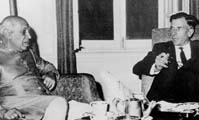I first heard of Galbraith when Rajiv Gandhi was alive and well. An intellectual poseur of the sort that one finds in Desi universities claimed that economics had nothing to offer since Galbraith. Half a decade later I came across a diagram of the history of economic thoughts in Samuelson’s textbook — Galbraith’s affluent society was one of the two branches coming out of the Neoclassical‑Keynesian synthesis (Friedman and the monetarists being the other). As a nerdy undergrad I read a bunch of his books, including The Age of Uncertainty (which was also watched with a bunch of equally nerdy brothers at our university library).
I was captivated by his writing, but I found his economics odd when I read The Ambassador's Journal. Ostensibly about his time in New Delhi during the waning days of Pundit Nehru, this also had commentary about farm subsidies and price controls in the United States. Reading many paragraphs along the line of ‘Told the President that give the X producers some money, and fix the price of Y at some rate, and impose a quota on Z, and we should be fine for a while’, I asked myself, ‘why not just let the market decide?’ — you see, it was Milton Friedman that I found intellectually more appealing, but about him some other day. Then I read Paul Krugman noting that Galbraith was sent to India because Kennedy didn’t think the Professor’s economics was as sound as his politics.
Of course, the politics of the Boston Brahmins is long over. Brad DeLong provides a good summary of Galbraith’s life and politics, and there are many more in the blogosphere. Not many, including this Desimal scientist, comment on his role during the India-China war of 1962. The conventional wisdom — JKG’s most famous contribution to our lexicon — is that Krishna Menon thought that the US offer of military help was a more dangerous threat to India than a border war over Aksai Chin (which Menon thought would not happen at all, despite the sabre-rattling by Indian politicians). According to his memoir, Galbraith offered Nehru military help in the summer of 1962, but Nehru refused on Menon’s advice. Yes, that war didn’t have as much of an impact in Desh’s history as wars in Afghanistan (see here). But a war is always a destructive endeavour, especially if it is over barren rocks that you never knew you had, and even more so if you lose. Perhaps a victory against China in 1962 would have dissuaded Pakistan from adventurism in Kashmir.
What if Nehru had listened to Galbraith? Historical what ifs are always fun, but I’ll leave them for some other time. Instead, let me say ‘so long’ to JKG with this photo of ‘the two smartest men in town, both from Cambridge’.

